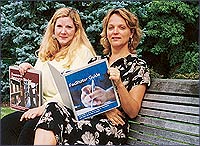


 |
 |
Issue Contents : : Around Tappan Square : : Page [ 1 2 3 4 5 6 7 8 9 ]
Smart Choices |
|
| Choices program
coordinators Sarah Vail '84 (left) and Lori Morgan Flood Photo by Rebecca Lammons '06 |
|
A new alcohol and drug reduction program requires student offenders to participate in a 90-minute interactive journaling session designed to motivate positive lifestyle changes. Students are charged $20 for the group session, which presents information about alcohol, a model for change, and concrete behavioral strategies, such as devising a plan of how much to drink before attending a party.
In past years, students who violated the alcohol and drug policy were given pro- bation, many times up to a year, says William Stackman, associate dean of students and the College's judicial coordinator. The new program--known as Choices--applies primarily to second-time offenders, who, depending on the offense, may be put on probation as well.
"This is an opportunity for students to reflect on their choices regarding use and abuse to decrease or eliminate risk in future situations," says Lori Morgan Flood, director of health education and co-facilitator of the class, which is offered twice a semester.
Developed by the Change Companies in Denver, the program has been shown to reduce future risk taking, such as inappropriate sexual conduct, an act that seems to go hand-in-hand with alcohol and substance abuse. The pairing of such behaviors is a concern on most campuses, and one that prompted President Nancy S. Dye to form the Task Force on Sexual Education and Ethics (TFSEE) two years ago. The group was largely in favor of bringing Choices to campus and adding the sexual offense component.
"I've had young clients who really suffered from their drug abuse and sexual conduct choices. HIV is not going away," says Sarah Vail '84, an HIV prevention specialist with Lorain County Alcohol and Drug Abuse Services. As a part-time alcohol, drug, and prevention specialist at the College, she co-facilitates Choices with Flood.
"I had very little awareness about my own choices as a student here," she adds. "Any drug and alcohol program on any campus will help folks become aware and self-aware. No one starts out wanting to be an alcoholic, but when you break rules for it, it's time to bring self-awareness into the big picture."
Dean of Students Peter Goldsmith says that while indicators suggest that alcohol use at Oberlin is low in comparison to peer schools, substance abuse does exist, and that it's the institution's responsibility to make sure that students have substantive education to make good decisions.
"The Family Educational Rights and Privacy Act gave colleges latitude to contact parents about alcohol infractions without the student's permission," he says. "Our general policy is to treat students as adults, and for them to live with the consequences of their decisions."
In 2001, Goldsmith spearheaded Oberlin's Good Samaritan Policy, a clause added to the College's Alcohol Intoxica-tion Policy that allows students to call campus security offices if they have an intoxicated friend in need of assistance, without fear of ramifications themselves.
Substance-free housing in Barnard House's 42-room residence hall presented a new option for students this fall who desired an alcohol and drug-free living space.
Kim LaFond, director and associate dean of Residential Life and Dining
Ser-vices, says the hall was formed out of student request and
made available through
an application process. By mid-August, about 40 returning students
were on the waiting
list; a large number of first-year students showed interest as
well.
"The highest risks for students on college campuses are the
negative consequences of abusing drugs and alcohol," says Flood, who, with Vail, will be evaluating
Choices and presenting its findings to the TFSEE at the end of the year.
"We want students to slow down and examine their motivations, knowledge, and behaviors related to high-risk use so they can make better choices."